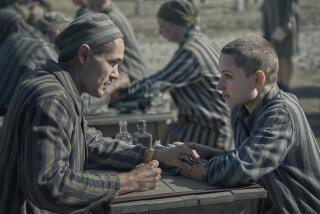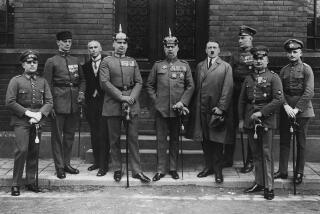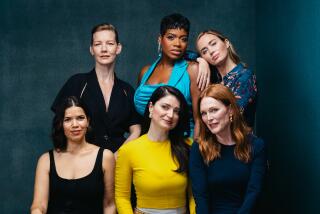A voice from the Fuhrer’s grave
A door opened in the Wolf’s Lair, a military field headquarters in East Prussia, and “a kindly old gentlemen came to us, smiling, with a soft voice. Meeting him was completely different than I imagined.”
The speaker is 81-year-old Traudl Junge; the man is, unbelievably, Adolf Hitler; and the film, “Blind Spot: Hitler’s Secretary,” is completely different from anything we could have imagined.
A riveting 90-minute encounter with the woman who was the German leader’s private secretary of choice from 1942 until his suicide in 1945, the equivalent of having someone suddenly materialize to report with first-person immediacy from Napoleon’s tent on the outskirts of Moscow, “Blind Spot” was a genuine sensation at its premiere at last year’s Berlin Film Festival.
Crowds struggled to get in and then sat absolutely still in pin-drop silence, unable to take their eyes off this articulate, insightful and ferociously honest woman who recounted in dramatic detail not only her experiences up to and including Hitler’s final chaotic days in his Berlin bunker but also her own agonizing struggles with her guilt about being a presence on the scene.
For no one is harder on Junge than she is on herself. No one is as unforgiving of the naive, apolitical young woman who was “so unaware and so thoughtless” that she could look on this terrible man as a kind of benign father figure.
Shielded from knowledge of Hitler’s barbaric projects while thinking her job had put her “in the center of information,” she tells Austrian co-directors Andre Heller and Othmar Schmiderer that “in fact, I was in a blind spot.”
Junge’s continual battles with herself, the formidable self-analysis that resulted from how deeply she has thought about this, not only adds insight to her memories but also gives them a kind of compulsive power. It’s as if Junge felt compelled by the weight of history to get her story out with the kind of vividness that takes us back in time along with her.
Junge had, over the past half century, spoken to historians about her experiences but she’d never publicly spoken this extensively. Intent on doing that before she died (which she did, amazingly, on the day after the Berlin premiere), Junge sat down for some 10 hours of interviews over at least three sessions, identifiable by the different outfits she wears.
In a daring and successful stylistic choice, directors Heller and Schmiderer include almost nothing in the film but Junge, shot in both middle distance and close up, looking at the camera and talking from her one-room Munich apartment. A few shots have her viewing and then expanding on earlier interviews, but nothing is allowed to distract from the impact of a single human presence with a powerful story to tell.
Raised by a divorced mother and a distant, tyrannical grandfather, Junge ended up as Hitler’s secretary, she says, “by complete coincidence and chance.” A friend got her a secretarial job in the Fuhrer’s chancellery, where she opened Hitler’s mail, largely from lovelorn women.
Victory in a typing contest got her an audition with the German leader, who told her, “If I take a pretty young secretary, someone marries them and takes them away.” Junge replied, “I’ve lived 22 years without a man, so that’s no problem for me.” Hitler laughed, and the job was hers.
Part of the fascination with “Blind Spot” is the way Junge’s revealing personal glimpses combine to create a portrait of a man whose recognizably human traits seem chilling in the context of who he was. Hitler disliked cold rooms, having flowers around (he hated dead things) and being touched. He could spend an entire evening playing with his German shepherd, Blondie, but he always washed his hands after petting her.
Junge, who daily had either lunch or dinner with Hitler, also has more philosophical observations to make. The Fuhrer never spoke about love -- “he never used the word” -- and he never spoke about the Jews. “Human life meant nothing to him,” she feels. “He didn’t think in human dimensions but about abstractions like nation or Reich.”
Junge’s recollections get most compelling as the walls start to metaphorically close in on Hitler. She saw him immediately after he had survived a 1944 attempt on his life by German officers, “with his hair standing on end, his trousers in tatters, saying, ‘I have been saved, destiny has chosen me, providence has preserved me.’ ”
Most surreal of all are Junge’s memories of the shadowy final days in the bunker, when people discussed different methods of suicide, and Hitler, who dictated his final will and testament to Junge, sat in a corridor with one of Blondie’s puppies in his lap, staring into space.
Junge was even present at Eva Braun’s wedding to the Fuhrer (“She told the staff, ‘You may now call me Frau Hitler’ ”) and recounts a beyond-belief end-of-days discussion between the two about a statue of a nymph on the foreign ministry grounds.
For Junge, who lived it all, escape into disbelief was not possible. Yet it is one of the real triumphs of this most specific of films that its lessons about blind spots are, by strong implication, intended for us as well. For no one can experience Junge’s story without realizing how oblivious we all can be to what seems obvious later on.
“Blind Spot” underlines how easy it is to be complicit in great evil and how hesitant we all should be about being sure of the moral correctness of what we do. To paraphrase the famous Santayana quote, those who do not understand the past may be condemned to repeat it.
*
‘Blind Spot’
MPAA rating: PG for thematic material
Times guidelines: adult subject matter
A Dor Film production, in association with the Heller Werkstatt, released by Sony Pictures Classics. Directors Andre Heller & Othmar Schmiderer. Producers Danny Krausz, Kurt Stocker. Cinematographer Othmar Schmiderer. Editor Daniel Pohacker. Running time: 1 hour, 30 minutes. Exclusively at the Laemmle Music Hall, 9036 Wilshire Blvd., Beverly Hills. (310) 274-6869.
More to Read
Only good movies
Get the Indie Focus newsletter, Mark Olsen's weekly guide to the world of cinema.
You may occasionally receive promotional content from the Los Angeles Times.











